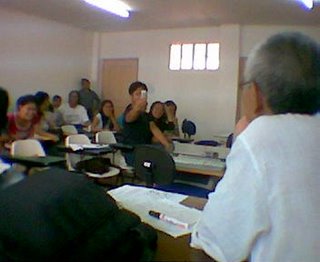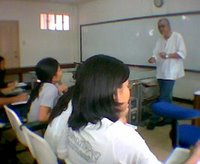
On August 30, 2006, Editor-in-Chief of Philippine Daily Inquirer Baguio Office and a respected Journalism professor in University of the Philippines Baguio (UPB),
Prof. Rolando "Rolly" Fernandez, shared his insights about blogging as a new form of Journalism in an open forum held at IB 204 in UPB.
According to him, there are about 4.5 billion bloggers around the world, and about a million are from the Philippines. In this sudden boom of bloggers worldwide, the debate on whether blogging should be considered as journalism simultaneously rises.
"Possibility of blogging as a form of Journalism...I say it is," said Prof. Fernandez in reaction towards the said issue. He said that Journalism tends to be a word that most people overwhelm. "There is nothing special with journalists (the professionals)...
ang trabaho nila is just to report events," he said in his aim to define what the word really stands for. As an answer to the raised question about blogging as a form of Journalism, he agrees that it is as long as what they do is the same thing as journalists do.
Blogging doesn't seem to be a threat to Journalism for Prof. Fernandez. For him, on-line reports actually compliment print medium in most ways, like in terms of maintaining immediacy.
As a personal opinion, Prof. Fernandez views blogging as an innovation in the Journalism profession. Advantages of blogging, like its multi-mediality, interactivity and low cost of production, can be used for their own benefits. He relays that through the use of internet, sharing information will be faster and a lot easier, but the down side of it will be due to the great pull of our striving economy into our ability cope with these modern technological advances. Not everyone has an ability to atleast own a computer and access the internet so for now the information that the internet has to offer will simply be limited to those who can afford.

For Prof. Fernandez, blogging seems to have a bright future, though it may not show now. But even with all the advantages it has to offer the field of Journalism, he worries about one consequence it can give--the continuous decline in the number of newspaper readership. He admits that most of today's generation tend to reject reading chunks of information from broadsheets due to impatience, and innovative sources of information are starting to overpower the print medium, but still he keeps his hopes up. With regards to this issue that print media is threatened by the boom of an alternative medium, he utters with great conviction, "not in my lifetime will I see the death of newspapers in this country. Not in my lifetime."
 The twins, taking pride of their beauty, once stood in silence right at the heart of Manhattan
The twins, taking pride of their beauty, once stood in silence right at the heart of Manhattan On September 11, 2001, an unexpected event disturbed the peace the twins had, two air crafts hit the twin towers which endanged the lives of thousand of people inside the building
On September 11, 2001, an unexpected event disturbed the peace the twins had, two air crafts hit the twin towers which endanged the lives of thousand of people inside the building People jump out of the building, as the fire continues to conquer the World Trade Center, with faintest hope of surviving
People jump out of the building, as the fire continues to conquer the World Trade Center, with faintest hope of surviving Moments later, the twins collapsed.
Moments later, the twins collapsed. "Tributes in Light"
"Tributes in Light"

